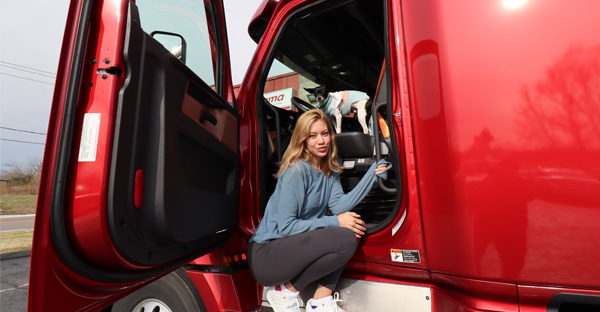
The trucking industry is dealing with a big problem: we are anticipating a shortage of 100,000 drivers in the next year. Companies are looking to fill these spots with new hires that may not have been able to thrive in the industry before.
In trucking and logistics, men make up 85% of the workforce. According to the American Trucking Association only about 7.8% of the United States' professional truck driver workforce are women, but THRC’s research, Millennials Have Drive 2, found that women make up about a third of ‘"warm leads" who say they may consider a job in trucking.
There are many benefits to hiring more women as truck drivers. Female drivers are, on average, more cautious than their male counterparts. Because of this, they get into fewer and less severe accidents. Women also speed less than men, resulting in fewer tickets, legal cases and lower insurance premiums for freight companies. Studies have also shown that women tend to be gentler with equipment than men, leading to less maintenance and the ability to use the equipment for more extended periods of time.
Many factors keep women from excelling behind the wheel, including presumptions about the trucking industry, societal norms and expectations, lack of childcare options and harassment. It is best for freight companies to tackle these barriers head-on by directly challenging misogynistic workplace culture, providing adequate benefits for all parents, and educating future generations on their ability to achieve success in a variety of workplaces.
Educate your employees
There are concerns about sexual harassment and assault for females on the job. Many trucking schools warn about the possibilities in the curriculum. Women on the job are sure to warn their peers of what they have experienced in an attempt to save them the trouble of being harassed or assaulted. Sharae Moore, the founder of S.H.E. Trucking, started a Facebook group and licensing program to help women entering the industry avoid companies known for tolerating sexual misconduct.
Gary Hollands, the owner of Interstate Trucking Academy, tries to combat the culture of sexual misconduct in the trucking industry by adding self-defense lessons and classes on dealing with sexual harassment to his company’s free training program. He believes it is important to prepare female drivers for the industry culture, as well as give them the tools to navigate situations of misconduct safely.
The trucking industry needs more people like Hollands, who acknowledge an overarching problem in the industry and are working to change the dangerous culture rather than throw women to the wolves and use the "that’s just how it is" excuse.
How to provide childcare solutions
Unfortunately, many mothers still find themselves in charge of most childcare responsibilities, and because of this the long hours of the trucker lifestyle can be tough to juggle while raising children. There have been stories of female truck drivers home-schooling their kids from the sleeper berth of the truck because they are unable to pay for child care on a trucker’s salary. Freight companies must do their very best to ensure mothers and caregivers have more affordable options for schooling their children so this does not happen.
Freight companies can solve these problems with adequate benefits for primary caregivers, such as paid parental leave, flexible hours that fit with the school day and affordable daycare options.
Developments from non-profits and government initiatives
There are many creative ways to empower women to take jobs in the freight industry. One such endeavor is Her Plover, a nonprofit that makes Girl Scout patches for troops to learn about careers in the supply chain. They also make coloring books about women in trucking and have a Cabbage Patch-style plush doll named Clare, described as a “driven young lady.”
Meanwhile, other nonprofits focus their efforts on convincing managers to hire women in the field. Ellen Voie, CEO of Women in Trucking, has spoken with 500 recruiters, trucking school operators and drivers in the past 14 years to convince them to train and hire more women.
Additional initiatives include nonprofits, government programs and trade groups in certain states like Oregon and New York that fund free certification for female drivers. Other companies advertise husband-and-wife driving duos to ease the burden of long hours and time spent away from home.
These efforts are working. The number of female truck drivers on the road rose about 30% from 2018 to 2019.
The future of the trucking industry and solving driver shortages hinges on freight companies’ abilities to hire and entice more female workers. It is important to challenge any workplace structure that directly creates a hostile environment for any gender or sexuality. By educating workers, questioning the status quo, and providing benefits so people can work in any citation, the freight industry has a real chance of eliminating the driver shortage.
Dmitri Fedorchenko is the CEO and co-founder of Doft, a free Load Board for Motor Carriers and Dispatchers.
Source: CCJ by Randall Reilly